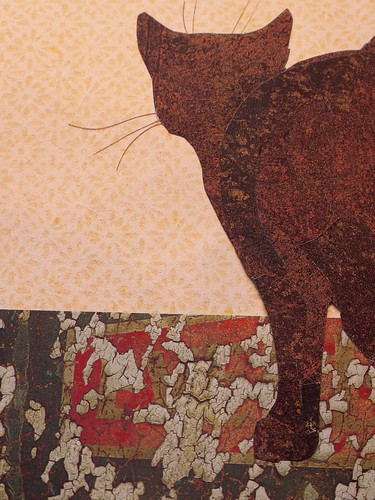
Wabi Sabi is a seriously gorgeous book. It’s big (the pages are 11 by 11 inches) and when you have it closed, the spine’s at the top—so you open it like a wall calendar, and it’s made up of a series of two-page spreads. The art, by Ed Young, is lovely: his collages, made of cut paper and other materials, are layered and full of texture. The colors in the book are sometimes vivid, sometimes muted: the bright green of pine needles in one spread is followed by a dusky-blue spread that incorporates a photo of Kyoto in the evening. Each spread also includes a column of Japanese characters, which turn out to be haiku by Basho and Shiki: they’re translated in the back of the book, and each one resonates, loosely, with the spread in which it appears, so it’s pleasing to flip back and look at the images again while thinking about the haiku.
The main text of the book, by Mark Reibstein, is less exciting to me than the art, but it’s well-written and interesting enough. Wabi Sabi, in the book, is a cat who lives in Kyoto: she’s never thought to wonder what her name means, but some visitors ask her master about it, and her master just says that it’s “hard to explain.” Wabi Sabi’s curious, now, and asks another cat and a dog if they know: but they also just tell her it’s hard to explain, though they each also offer a haiku that gives a little insight. To really understand her name, Wabi Sabi travels to Mount Hiei, where she meets a monkey who teaches her about beauty in the simple, imperfect, quiet, dark, and natural. Contented, she heads back to Kyoto a little wiser. The text is all presented in haibun form, which I hadn’t heard of before, but which the back of the book explains: it’s a traditional form used by Basho and others, in which each haiku is preceded by a short prose passage. Reibstein’s haiku sometimes feel lacking (e.g. “A wise old monkey/living among the pine trees/knows wabi sabi”) but are sometimes really satisfying (e.g. “Yellow bamboo stalks/bow by teahouse doors so low/emperors must kneel”).
Leave a Reply